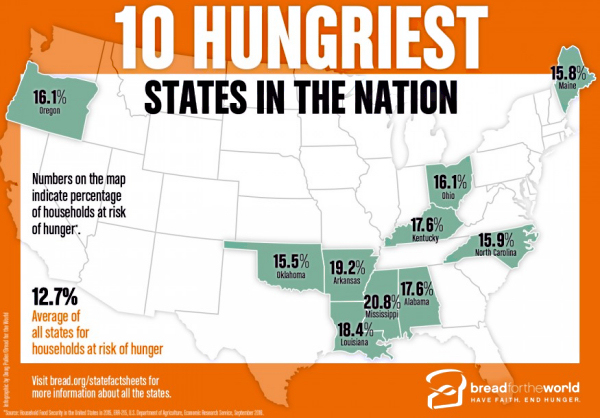By Jean Blish Siers *
 Two conversations on Monday left me deeply troubled by our country’s priorities. First, a woman from Communities in Schools called. She serves one of the largest (and more affluent) high schools in Charlotte. But CIS works with those students who have fallen in some way through the social safety net. She had a student with diabetes and other chronic health issues. The student’s mother, who is single, receives some SNAP benefits, but there simply isn’t enough money to buy the nutritious food this student needs to help manage her health. The counselor said the student has been having mini-strokes and realized that she needs to take control of her health, but needs help finding good food rather than the processed items more readily available in her neighborhood.
Two conversations on Monday left me deeply troubled by our country’s priorities. First, a woman from Communities in Schools called. She serves one of the largest (and more affluent) high schools in Charlotte. But CIS works with those students who have fallen in some way through the social safety net. She had a student with diabetes and other chronic health issues. The student’s mother, who is single, receives some SNAP benefits, but there simply isn’t enough money to buy the nutritious food this student needs to help manage her health. The counselor said the student has been having mini-strokes and realized that she needs to take control of her health, but needs help finding good food rather than the processed items more readily available in her neighborhood.
This isn’t an isolated issue. People with lower incomes, young and old alike, suffer from greater health problems – and face greater health costs – because the food they eat simply isn’t good for them. I offered the counselor the names of groups we work with who make an effort to get more fresh items into their pantries and kitchens, and I felt incredibly helpless.
Later that day, I bumped into Tina Postel, director of Loaves and Fishes, our local food pantry network. Loaves and Fishes served 75,000 clients through their 30 pantries in 2017, and 46% of those were children. Tina had just learned that they (along with multiple other agencies and shelters in Charlotte) were losing a chunk of federal funding, a combined cut of $500,000. The reason? Charlotte’s unemployment rate is below the 6.5% threshold, and our poverty rate is below the 17.3% threshold for those dollars.
Our lower poverty and unemployment numbers are great news for many of our residents. But not everyone has benefited equally from Charlotte’s economic boom. For the past several years, groups in Charlotte have been studying our lack of equity and social mobility. In Charlotte, a child is born in poverty will most like spend her entire life in poverty. We are in the midst of an affordable housing crisis with an estimated 52,411 housing insecure households and a deficiency of 21,195 rental units for low-income households. Thus, even if you are working full time – and helping out our low unemployment rate – you still struggle to find affordable housing. For those who pay more than 50% of their income on housing, food security goes next.
In our community and many others, working a full-time job does not guarantee safe, affordable housing. It doesn’t guarantee decent health care. It doesn’t guarantee quality schools and a better life for your children. And it certainly doesn’t guarantee nutritious food on plates. I work with fantastic partner agencies, each doing its best to care for the most people with the least resources. Now they’ll have to make do with a little less. I can’t help but think of that student, already struggling with her health. What health issues will she bring with her into adulthood if we don’t care for her now? It’s a question for Charlotte. It’s a question for all of us.
* Jean Blish Siers is SoSA gleaning coordinator in the Charlotte, North Carolina area
JUN
2018

